|
|
|
Sort Order |
|
|
|
Items / Page
|
|
|
|
|
|
|
| Srl | Item |
| 1 |
ID:
192279
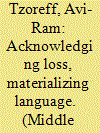

|
|
|
|
|
| Summary/Abstract |
This article focuses on Rabbi Yosef Hayyim's discussions of translation and hermeneutics, as a reflection of the broad movements between languages throughout the Ottoman Empire and the Indian Ocean, and the linguistic inequalities that characterized them. Reading Hayyim against his Baghdadi context, considering the printing and translational activities of the British missionaries of the London Society for Promoting Christianity amongst the Jews and the hermeneutics that were developed in the Baghdadi Salafiyya, I argue that Hayyim's opposition to the translation of Jewish Kabbalistic knowledge should not be seen as a conservative approach that prevents its popularization, but as an understanding of the linguistic power relations involved within the act of translation. Juxtaposed vis-à-vis his uses of Arabic translations in other responsas and his call for the teaching of standard Arabic in Jewish schools in Baghdad, that cohered with the Nahdawi perception of Arabic as a major aspect of the Ottoman Mashriq Arab political community, I argue that these incidents reflect different intersections of languages and power that occurred in the urban sphere of Ottoman Baghdad.
|
|
|
|
|
|
|
|
|
|
|
|
|
|
|
|
| 2 |
ID:
187435
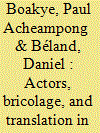

|
|
|
|
|
| Summary/Abstract |
Due to the centrality of education to economic growth and social development, successive governments in post-colonial Ghana have implemented policies to improve the quality of education in the country. In line with this, Ghana embarked on its first major education reform in 1987 under the Provisional National Defence Council (PNDC) government. While several studies have been conducted to explain this reform, these studies have largely been descriptive and theoretically, have over relied on the conditionality thesis. Our study draws on ideational literature and research interviews to offer an alternative explanation of the 1987 reform. Drawing extensively on the ideational concepts of bricolage and translation and focusing on the actors using these two mechanisms, the study argues that, while exogenous forces did impact the 1987 reform, it was mainly driven by endogenous factors featuring both path dependent and departing changes.
|
|
|
|
|
|
|
|
|
|
|
|
|
|
|
|
| 3 |
ID:
163252
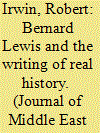

|
|
|
|
|
| Summary/Abstract |
Recent appraisals of Bernard Lewis’s career and scholarship have tended to neglect somewhat the research he carried out at London University’s School of Oriental African Studies (SOAS) before his move to Princeton in 1974. This early work resulted in important publications on Isma‘ilism, the Ottoman archives and modern Turkish history, but he also published highly influential books dealing with pre-modern Islamic history and culture. A survey of his early publications reveals certain recurring topics and preoccupations, including Isma‘ilism considered as a political and cultural revolution manqué, the potential dangers of a clash of civilizations, and Muslim responses to the challenges of modernization and Westernization. Lewis’s style and lucidity have contributed greatly to his influence as a historian.
|
|
|
|
|
|
|
|
|
|
|
|
|
|
|
|
| 4 |
ID:
168986
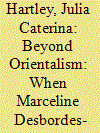

|
|
|
|
|
| Summary/Abstract |
This article follows a thread of translation and intertextual dialogue, taking us from the thirteenth-century Persian poet Saʿdi to the nineteenth-century French poet Marceline Desbordes-Valmore. It reads Desbordes-Valmore’s poem ‘Les roses de Saadi’ (1860) with the two passages from Saʿdi’s Golestān from which it was inspired, shedding new light on the poem’s metapoetic subtext. The original Persian text is compared to two French translations that were circulating at the time when Desbordes-Valmore was writing. This analysis of the Golestān’s reception forms the basis for the argument that Desbordes-Valmore recast in secular terms Saʿdi’s discourse on poetic language, emphasizing the continuity, rather than difference, between her concerns and Saʿdi’s. The case of Desbordes-Valmore thus reveals a forgotten facet of nineteenth-century French engagements with Middle Eastern culture: one of identification and literary influence, which existed alongside the processes of “othering” for which the period is better known.
|
|
|
|
|
|
|
|
|
|
|
|
|
|
|
|
| 5 |
ID:
168023
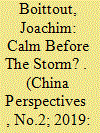

|
|
|
|
|
| Summary/Abstract |
This article revisits intellectual and literary trends in the few years preceding the launch of the New Culture Movement. Focusing on translations of texts dating from 1912 to 1915, this study explores how a group of writers usually considered conservative ventured to question the reliance of the individual on political structures that underpinned the then prevailing intellectual framework. I argue that these texts competed through literary means and preceded the claim of self-awareness forcibly voiced by New Culture activists in 1915 by achieving what I call a turn to the intimate. Reassessing the necessity to translate these texts as we celebrate this year the centenary of May Fourth Movement, this approach seeks to resurrect the long-forgotten but thriving literary and intellectual context from which the New Culture Movement’s ideas sprouted.
|
|
|
|
|
|
|
|
|
|
|
|
|
|
|
|
| 6 |
ID:
104013
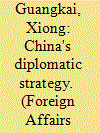

|
|
|
|
|
| Publication |
2010.
|
| Summary/Abstract |
The Chinese term of "Tao Guang Yang Hui" (meaning "not to show off one's capability but to keep a low profile") has become a vital component of China's diplomatic strategy and likewise one of the keywords for understanding and grasping China's foreign policy. A correct understanding and an accurate translation of the term "Tao Guang Yang Hui" is conducive to bringing home to the outside world China's foreign policy, enabling the international community to acquire a better understanding of China's option for a road of peaceful development, and upholding as well as projecting a favorable image of China in the world.
|
|
|
|
|
|
|
|
|
|
|
|
|
|
|
|
| 7 |
ID:
142847
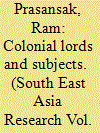

|
|
|
|
|
| Summary/Abstract |
This paper exposes colonial remnants in modern-day Thailand through a postcolonial materialist analysis of Lao Khamhom's 'Dust Underfoot'. Revolving around the conflict between a minor member of the Bangkok royalty and a Khmu forest worker in northern Thailand, this short story sheds light on Siam's semicolonial conditions created at the turn of the nineteenth century. Though nominally independent, Siam was subject to the capitalist world economy. This was clearly discernible in the British-dominated teak industry in the North. Siam, however, was not so much a victim as a collaborator and beneficiary of colonial capitalism. The Siamese monarchy sustained British capital by recruiting Khmu ethnic subjects into an exploitable labour force for timber production. This collaboration with the British enabled the monarchy to consolidate its economic, political and cultural power over its population. 'Dust Underfoot' underscores Siam's colonial legacies by critiquing the continued exploitation of the Khmu and other lumbermen by the emerging Thai sakdina-turned-bourgeois class in the 1950s. Following in the footsteps of the West, these royal elites viewed themselves as civilized rulers lording it over their 'savage' subjects. This paper also discusses the story as a seditious challenge to the hegemonic Buddhist 'god–king' discourse and translational process that underpins the foundation of the rule of the Thai monarchy.
|
|
|
|
|
|
|
|
|
|
|
|
|
|
|
|
| 8 |
ID:
159390
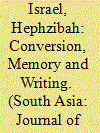

|
|
|
|
|
| Summary/Abstract |
Examining autobiographical statements left by South Asians converting to Christianity from the nineteenth century onwards, this article investigates the function of memory and literary narrative in three features common to several accounts: the translation of conversion accounts; the reconstruction of past events through narrative devices; and the re-formation of the Protestant individual conceived as part of a larger project of ‘reforming’ India as a state of progressive modernity. It argues that personal memory is inflected by conventions of writing about conversion, pressing into service specific tropes to exhibit the convert as ‘Protestant’. This economy of recall allowed converts to participate in wider public debates on religious and social reform by re-enacting conversion and confession in autobiography.
|
|
|
|
|
|
|
|
|
|
|
|
|
|
|
|
| 9 |
ID:
140100
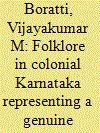

|
|
|
|
|
| Summary/Abstract |
This article offers a comparative study of the multiplicity of folklore scholarship in Karnataka during the colonial period, revealing multiple layers of knowledge, experience and interculturality. It concentrates mainly on viewing three specific collections of Indian folklore by different agents, both colonialists and locals. The overarching aim is to achieve a deeper understanding of various research methodologies and their influence. This article also seeks to address some subsidiary questions regarding the prominence given to oral literature during the second half of the 19th century. It examines what relations, specifically in the eyes of the coloniser and the colonised, it shared with the classical/ancient works of literature of India and seeks to assess the nature of folklore knowledge produced in colonial Karnataka.
|
|
|
|
|
|
|
|
|
|
|
|
|
|
|
|
| 10 |
ID:
185874
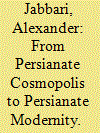

|
|
|
|
|
| Summary/Abstract |
This article examines twentieth-century Persian translations of Urdu-language works about Persian literature, focusing on two different Persian translations of an influential Urdu-language work on Persian literary history, Shiʿr al-ʿAjam (Poetry of the Persians), by Shibli Nuʿmani. The article offers a close, comparative reading of the Afghan and Iranian translations of Shiʿr al-ʿAjam in order to understand why two Persian translations of this voluminous text were published within such a short time period. These translations reveal how Indians, Afghans, and Iranians were invested in the same Persianate heritage, yet the emergence of a “Persianate modernity” undergirded by a cultural logic of nationalism rather than cosmopolitanism, along with Iran’s and Afghanistan’s differing relationships to India and Urdu, produced distinct approaches to translation.
|
|
|
|
|
|
|
|
|
|
|
|
|
|
|
|
| 11 |
ID:
181137
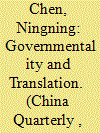

|
|
|
|
|
| Summary/Abstract |
This paper explores the cultural politics of lineage landscapes in contemporary rural China. Drawing on a combined governmentality/translation approach and ethnographic fieldwork in rural Wenzhou, it examines how the state governs the production of lineage landscapes and how local lineages translate governmental technologies in complex ways. Empirical evidence reveals that the government develops diversified rationalities and modes of governance to direct the (re)construction of lineage landscapes. It is also found that local lineages are skilled at appropriating state discourses and practices as well as enrolling other (non-)human actors, thereby legitimizing their landscape projects of ancestral tombs and memorials. On the ground, they often displace state objectives with the production of their preferred landscape (for example, “chair” tombs). Respectful of ancestors, state agents sometimes turn a blind eye to local displacement; however, while encountering challenges from the higher-level government, they intensify regulation, but lineages still retain the capacity to negotiate with them. With sensitivity to the entanglement of diversified actors and their dynamic interactions, this paper underlines the multiplicity and contingency of state governance and societal responses. It also foregrounds the cultural politics of lineage landscapes as a process of translating governmental technologies characterized by continuous mobilization, displacement and negotiation in a heterogeneous network.
|
|
|
|
|
|
|
|
|
|
|
|
|
|
|
|
| 12 |
ID:
127084
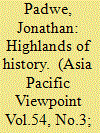

|
|
|
|
|
| Publication |
2013.
|
| Summary/Abstract |
The notion that Cambodia's highland people may claim a distinct 'Indigenous' identity has emerged only recently in Cambodia. To date, advocacy for rights under the banner of indigeneity has produced few results for highlanders. Among the problems faced by advocates for Indigenous rights, problems of definition and translation represent an important challenge. Arguing that concepts like 'Indigeneity' are not simply adopted ex nihilo in new settings, but are rather incorporated into existing structures of meaning, this paper explores culturally produced understandings of who highlanders are, concentrating in particular on the way that the term 'Indigenous' has been translated into Khmer. The use of the Khmer word daeum, or 'original', to distinguish between Indigenous and other forms of ethnic belonging in the newly derived translation of 'Indigenous Peoples' points to historically sedimented beliefs about highlanders as living ancestors of modern Khmers.
|
|
|
|
|
|
|
|
|
|
|
|
|
|
|
|
| 13 |
ID:
184791
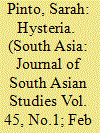

|
|
|
|
|
| Summary/Abstract |
Ways of mapping mental illness in the world involve stories about history, time and qualities of knowledge. This paper explores the history of hysteria as a South Asian story. With a South Asia-centred history of the contemporary critical concept of cultural translation, this paper observes not only hysteria’s long South Asian history, but the colonial emergence of a defining narrative—the equation of hysteria to spirit possession, a naturalised conceptual arrangement that superimposed upon a long history of medical encounters racialised ideas about epistemological difference.
|
|
|
|
|
|
|
|
|
|
|
|
|
|
|
|
| 14 |
ID:
177194


|
|
|
|
|
| Summary/Abstract |
This introduction to ‘Translating Sex’ places the six essays included in this special section in the context of the history of sexuality in the Indian subcontinent, and argues for a need to write more comprehensive histories of sexology—the field of inquiry which promoted the understanding of sex as a ‘scientific object’ around the globe at the turn of the twentieth century. It identifies the divergent materials covered in, and the common grounds occupied by, the six essays that deal with sex as a translated object of knowledge; considers the history of vernacular sexology; and showcases the ubiquity of sexology in socio-cultural, political and literary debates in the Indian subcontinent in the first half of the twentieth century. It argues that by locating sexology in Indian history, we can render ‘sexuality’ a more useful category of analysis for this context as well as comprehend what might be termed the sexuality of Indian history.
|
|
|
|
|
|
|
|
|
|
|
|
|
|
|
|
| 15 |
ID:
140512


|
|
|
|
|
| Summary/Abstract |
This article critically interrogates how borders are produced by scientists, engineers and security experts in advance of the deployment of technical devices they develop. We trace how sovereign decisions are enacted as assemblages in the antecedent register of device development through the everyday decisions of scientists and engineers in the laboratory, the security experts they engage, and the material components of the device itself. Drawing on in-depth interviews, observations, and ethnographic research of the EU-funded Handhold project, we explore how assumptions about the way security technologies will and should perform at the border shape the development of a portable, integrated device to detect chemical, biological, radiological, nuclear and explosives (CBRNE) threats at borders. In disaggregating the moments of sovereign decision-making across multiple sites and times, we question the supposed linearity of how science comes out of and feeds back into the world of border security. An interrogation of competing assumptions and understandings of security threats and needs, of competing logics of innovation and pragmatism, of the demands of differentiated temporalities in detection and identification, and of the presumed capacities, behaviours, and needs of phantasmic competitors and end-users reveals a complex, circulating and co-constitutive process of device development that laboratises the border itself.
|
|
|
|
|
|
|
|
|
|
|
|
|
|
|
|
| 16 |
ID:
169975
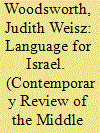

|
|
|
|
|
| Summary/Abstract |
Contrary to common misperceptions, translation is not merely a subsidiary or secondary art but is a critical, productive, and generative process. At key moments in history, translation has helped to strengthen languages, build national literatures, and construct national identities. The case of Hebrew provides a unique example of an ancient sacred language that has evolved into a modern and functional one, now the primary official language of Israel. This article provides an overview of translational activity in Israel, with a focus on the profound impact that translation has had on the development of the Hebrew language. Translations of foreign literature served to nourish an emerging Hebrew literature, diversify its repertoire, and build the resources of the language itself. Translation was even viewed as an integral part of nation building, as illustrated by the vision and personal involvement of Israel’s first Prime Minister, David Ben-Gurion, which culminated in a program of translating world masterpieces to create an “Intellectual State” in addition to the new political one.
|
|
|
|
|
|
|
|
|
|
|
|
|
|
|
|
| 17 |
ID:
175481
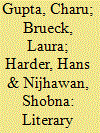

|
|
|
|
|
| Summary/Abstract |
This collection brings together nine essays, accompanied by nine short translations, that redraw the boundaries of literary histories both temporally and spatially. The essays, rooted in the humanities and informed by interdisciplinary area studies, explore multiple linkages between forms of print culture, linguistic identities and diverse vernacular literary spaces in colonial and post-colonial South Asia. The essays and translations foreground complex and politicised expressions of gender and genre in fictional and non-fictional print materials and thus draw meaningful connections between the vernacular and literature, the everyday and the marginals, and gender and sentiment. Collectively, they expand vernacular literary archives, canons and genealogies, and push us to theorise the nature of writing in South Asia.
|
|
|
|
|
|
|
|
|
|
|
|
|
|
|
|
| 18 |
ID:
169036
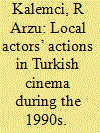

|
|
|
|
|
| Summary/Abstract |
This study analyzes changes in Turkish cinema in the 1990s. During this time, Turkish cinema was exposed to changes resulting from globalization and the foreign domination of cinema that came along with it. More recently, Turkish cinema has seen noticeable growth. By adopting a political economy perspective, this study investigates how the local actors of Turkish cinema, which were on the defensive, were able to overcome significant challenges.
|
|
|
|
|
|
|
|
|
|
|
|
|
|
|
|
| 19 |
ID:
129499
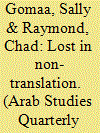

|
|
|
|
|
| Publication |
2014.
|
| Summary/Abstract |
Undergraduate college student in the USA often encounter the Arab Middle East through novels translated into English. These novels are often presented by instructors and understood by students as stylized but accurate depictions of Arab societies as they currently exist. This article argues that the extremely limited number of translated Arabic novels that have made their way into American classrooms perpetuate stereotypes about Arab societies. These novels present student with themes that are often a historical and infused with violence, misogyny, and religious fanaticism. Although students may be highly interested in learning about Arab societies, the literary content they come across encourages affective rather than critical or complex responses.
|
|
|
|
|
|
|
|
|
|
|
|
|
|
|
|
| 20 |
ID:
138261
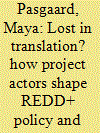

|
|
|
|
|
| Summary/Abstract |
Forest protection policies to Reduce Emissions from Deforestation and forest Degradation (REDD+) are currently being implemented by international donors, governments and conservation agencies across the developing world aiming for reduction of greenhouse gases while ensuring fair distribution of benefits. This paper draws on a case study in northern Cambodia to analyse how conservation practitioners and the local forest management committees engaged in implementing REDD+ actively translate and influence the policy and its implementation in accordance with their respective interests through particular communication strategies. When assessing project progress and outcomes, the conservation practitioners involved in implementing projects show an interest in emphasising positive project assessments by downplaying potential project complications, and by primarily communicating with pro-REDD+ members of the local communities. Powerful actors in the local forest management committees adopt the conservation rhetoric of these practitioners; at the same time, they can interpret and control local access to resources to their own advantage. By doing so, they can ensure continued support, while not necessarily representing all community members or sharing benefits equally. The processes and consequences of this policy translation in a REDD+ arena are discussed and compared with existing dominant trends in environment and development policies.
|
|
|
|
|
|
|
|
|
|
|
|
|
|
|
|
|
|
|
|
|